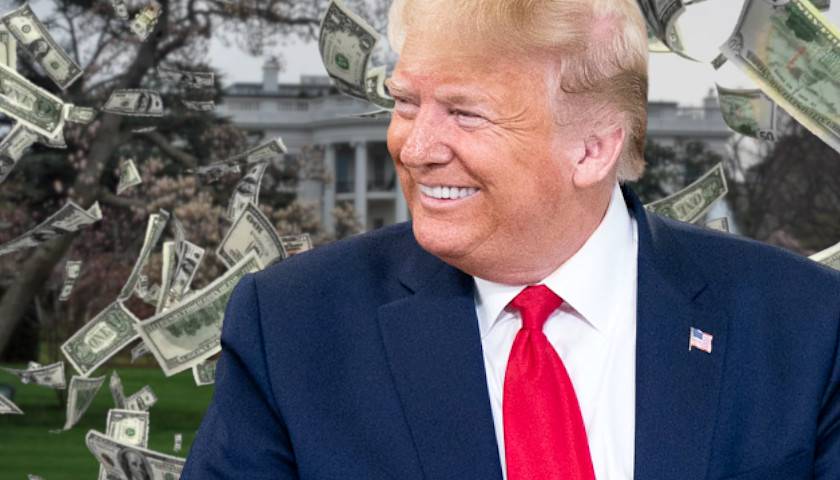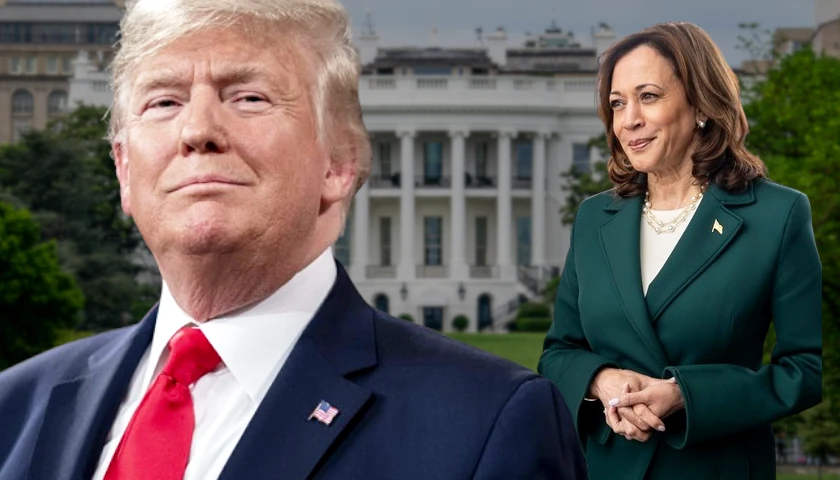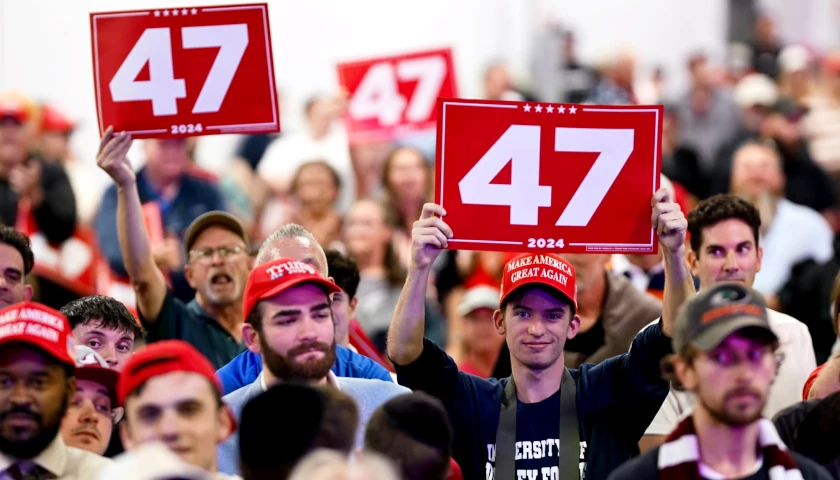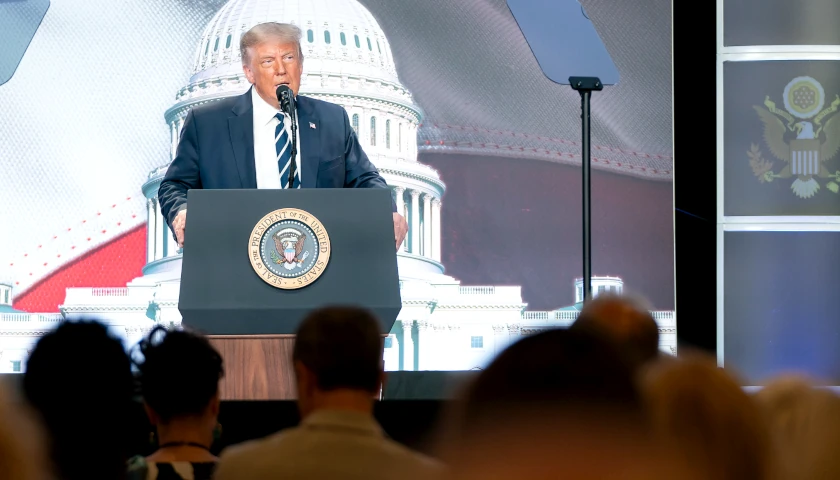by Arjun Singh
Former President Donald Trump has been leading his Republican presidential nomination rivals in small-dollar donations by a large margin, underscoring the breadth of his support, experts tell the Daily Caller News Foundation.
A small donor contributes less than $200 to an individual candidate’s campaign, out of a maximum of $3,300 for the 2023-2024 electoral cycle, per the Federal Election Commission (FEC), with a greater number of small donations — as a share of total fundraising — indicating a larger base of support. Currently, 81.8% of donations to Trump’s campaign have been made by small donors, according to an Axios assessment of FEC data.
“Small-dollar donors are a good reflection of where rank-and-file voters are in any given election, and they’ve always been Trump’s ace-in-the-hole,” wrote William Francis Buckley O’Reilly, a Republican political consultant, to the DCNF. Excluding Trump’s political action committees (PACs), of which he has several, small donations account for the bulk of the nearly $36 million that his campaign has raised since his announcement, according to FEC reports.
 “Small donors are and always will be important. Their contributions should be viewed as an investment in the candidates they donate to. It’s a demonstration of loyalty. Moreover, changes in how money is raised have made them more rather than less significant,” wrote Peter Roff, a contributing editor at Newsweek and Republican political strategist, to the DCNF. He added that “Online fundraising empowers the small donors, not individually but as a group.”
“Small donors are and always will be important. Their contributions should be viewed as an investment in the candidates they donate to. It’s a demonstration of loyalty. Moreover, changes in how money is raised have made them more rather than less significant,” wrote Peter Roff, a contributing editor at Newsweek and Republican political strategist, to the DCNF. He added that “Online fundraising empowers the small donors, not individually but as a group.”
That empowerment has been evident of late in the Republican National Committee’s criteria for candidates to qualify for all-important presidential primary debates, the first of which will be held on Aug. 23. Candidates must have donations from at least 40,000 individuals, with 200 unique donors each in 20 different states or territories, the RNC’s criteria state.
Several candidates with low standing in polls have taken to innovative schemes to obtain enough small donations to get on the debate stage, likely hoping their performance will boost their campaigns. Republican Gov. Doug Burgum of North Dakota has taken to distributing $20 gift cards in exchange for donations, while Vivek Ramaswamy has promised donors a share of every donation they obtain through their referrals.
Republican Mayor Francis Suarez of Miami, meanwhile, announced a sweepstakes where a lucky donor would receive one year of free college tuition in exchange for contributing to his campaign.
Even as these candidates assiduously court small donors, no other candidate in the race comes close to Trump’s small donor contribution share. Only Ramaswamy exceeds 50%, with 57.5%, while the other candidates lag below him, according to FEC data.
Among them, Republican Gov. Ron DeSantis of Florida, widely regarded as Trump’s primary opponent in the race and second to him in polls, has just 17.5% of his campaign’s funds sourced from small donors, according to FEC data. The number is prompting concern by experts who spoke with the DCNF, who suggest that the deficit is more instructive than polling data regarding his ability to overtake Trump’s wide lead, currently a 35.8 percentage point difference, according to RealClearPolitics.
“DeSantis’ inability to get small dollars speaks to his inability so far to connect with the Republican base despite trying to outflank Trump on the right,” said Bruce Cain, the Charles Louis Ducommun Professor of Political Science at Stanford University, to the DCNF.
DeSantis currently has over 86,000 donations of $200 or less, according to a source familiar with the matter. Trump, by contrast, has at least 147,000 donors of $200 or less, according to calculations by the DCNF based on public data.
“Our campaign is grateful for the tens of thousands of grassroots supporters who have made it possible for us to build an unmatched organization in the early nominating states with the ability to compete for the long haul,” wrote Andrew Romeo, the Communications Director of DeSantis’ campaign, to the DCNF.
Where DeSantis outflanks Trump, however, is in large donations from wealthy donors to his super PACs, which have no contribution limits. DeSantis’ primary Super PAC, Never Back Down, raised over $130 million in the first half of 2023, according to FEC data reported by CNN, with most of the money coming from two sources — DeSantis’ state PAC in Florida, and wealthy real estate developer Robert Bigelow of Las Vegas.
Trump’s super PACs, by contrast, raised merely $14 million in 2023 and spent nearly 2.5 times that amount using money raised in 2022 — particularly, on his legal fees following three indictments in New York, Florida and Washington, D.C. Many billionaire Republican donors, such as Ken Griffin, Steve Schwartzman, Richard Uihlein and Jeffrey Yass, have donated large sums to DeSantis’ PACs in an effort to defeat Trump’s candidacy.
DeSantis has innovatively made use of the cash-rich Never Back Down PAC in recent bus tours it has organized, where he is formally a “special guest,” according to campaign press releases shared with the DCNF. Federal law prohibitscoordination between a campaign and a Super PAC.
Cain and Roff have expressed concern over this arrangement, suggesting that DeSantis may become beholden to wealthy donors as opposed to political currents needed to win votes, leading to the life of his campaign being prolonged even his chances of winning may recede.
“[U]nlike small givers, [wealthy donors] can keep weak and failing campaigns going long after it’s clear they’ve run out of steam. Certain candidates for the GOP nomination are already at that point, even if they don’t know it yet,” Roff said when asked about DeSantis.
“DeSantis is in a more precarious position if the big donors decide he can’t cut it. There is no emotional attachment with big donors,” Cain said, warning that “[h]e must deliver the polling numbers and election results, or they will cut him off. Nothing personal—just business.”
It remains to be seen whether DeSantis, who has attempted to “reset” his campaign with staff layoffs and strategy adjustments, will be able to generate the grassroots support necessary to compete with Trump. “Any Republican candidate hoping to break through is going to need tangible grassroots support, but, to date, none has yet captured the imagination of everyday Republicans,” O’Reilly noted.
“And, the clock is ticking.”
Trump’s campaigns did not immediately respond to a request for comment.
– – –
Arjun Singh is a reporter at Daily Caller News Foundation.




